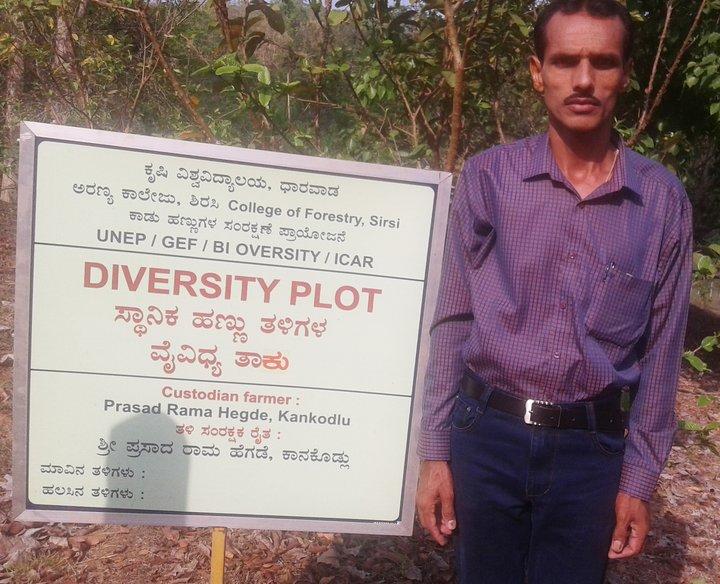Krishi Pandita agriculturalist award granted to custodian farmer in India

A close associate of the Tropical Fruit Tree Project, Prasad Rama Hegde, recently received the prestigious Krishi Pandita award for his work on agricultural biodiversity.
Indian farmer Prasad Rama Hegde recently received the Krishi Pandita award from the state of Karnataka. The national award is granted to farmers who have made a unique contribution to agricultural practices in India. Hegde is being recognized for his work on agricultural biodiversity and sharing his knowledge of local crop varieties with other local farmers.
Prasad Rama Hegde, a young, progressive farmer and grafting expert, hails from Kankodlu, a village near Sirsi in the central Western Ghats, Karnataka, India. From a farming family, Prasad has graduated and obtained a B.A. Degree at Sirsi. Today he grows a diversity of crops such as arecanut, coconut, jackfruit, mango, banana, black pepper, turmeric, cardamom, cinnamon and dozens of medicinal plants in his five-acre farmland. He has a passion to identify important varieties of tropical fruits around his village and propagating them through grafting and integrating them in his farm.
Over the years, Hegde has accumulated thousands of such saplings, which he distributes among fellow farmers and visitors. Hegde has identified and multiplied four locally important varieties of appemidi mangoes (aromatic pickled mangoes), three varieties of table mangoes, and three varieties of jackfruit. His farmland is a rich repository of germplasm of commercially-important species, including twelve local types of black pepper, six types of banana, about twenty varieties of mango—and the list continues to grow. With assistance from the College of Forestry, Sirsi under the Global Environment Facility funded project and implemented by United Nations Environment Programme and technically executed by Bioversity International on tropical fruits, Hegde has established a 'diversity plot' of local mango and jackfruit varieties.
Over fifty local types of appemidi mangoes, twenty varieties of jackfruit and Garcinia fruits were planted three years ago. This is the largest repository of locally important tropical fruits in this region. Today Hegde has started sharing the scion material of all these varieties with local farmers - scions are young shoots or twigs of a plant cut for grafting or rooting.
At least fifty farmers visit his farm every year to learn about integration of different species and to relish mango fruits during the season. Apart from creating awareness on the importance of the local varieties to visiting farmers, he also distributes desirable saplings to the farmers. He also visits local schools to educate students on the values of local varieties and distributes the saplings to them.
Mr. Prasad Hegde was a recipient of the Best Agriculturist Award from the University of Agricultural Sciences, Dharwad in 2013 and earlier recognized as a 'custodian farmer' by the Tropical Fruit Tree Project.
Recently, the Government of Karnataka, India conferred a coveted Krishi Pandita award on him – an annual award is given to selected handful of agriculturists in the state of Karnataka. The award will be presented to him by the Chief Minister of the state. The award committee has specifically cited the establishment of his diversity block as one of his achievements. Mr. Hegde’s association with the Tropical Fruit Trees project has enriched him with newer tools and enhanced his technical skills to identify newer varieties.
Find out more about our work on tropical fruit trees
Partners:
The ‘Tropical Fruit Tree’ project – also called ‘Conservation and Sustainable Use of Cultivated and Wild Tropical Fruit Tree Diversity: Promoting Sustainable Livelihoods, Food Security and Ecosystem Services’ – was launched in 2009 with the funding of the Global Environment Facility (GEF). It is implemented through the United National Environment Programme (UNEP) and lead by Bioversity International with the four country partners: India: Indian Council of Agricultural Research (ICAR) Indonesia: Indonesian Centre for Horticulture Research and Development (ICHORD) Malaysia: Malaysian Agricultural Research and Development Institute (MARDI) Thailand: Department of Agriculture (DoA)
